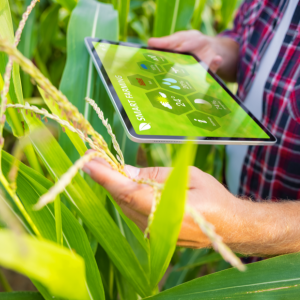Date: 15 Jul 2024
In recent years, the agricultural industry has undergone significant technological advances. The adoption of technology has allowed farmers to increase their productivity, reduce costs and optimize all processes. Agriculture plays a crucial role in providing food for the world's population, which does not stop growing and, accordingly, the need for more resources is constantly increasing. Therefore, it is imperative to adopt sustainable practices that can help ensure these while minimizing the impact on the environment. Technology plays an important role in achieving this goal. Through their integration, efficiency can be increased, waste can be reduced and sustainability can be improved. In this article, we explore how technology is impacting the agribusiness industry and how it can help us build a greener future.
Machine automation
One of the significant advantages of technology in the agricultural industry is the integration of machine automation. Automation in agriculture is the use of robots and machines to perform tasks that were previously done manually by humans. Machines such as tractors, drones and robots can now plant, water and harvest crops with minimal human intervention. This technology significantly reduces labor costs and increases productivity. It also allows farmers to work more efficiently and significantly reduces the risks associated with manual labor.
Data collection and analysis
Technology allows farmers to collect and analyze data more efficiently. With the advent of IoT (Internet of Things), devices and sensors can now be placed on farms to collect data on soil, temperature, humidity and other factors. This information can then be analyzed using machine learning algorithms to provide insight into crop growth, yield and plant disease management. Farmers can use this data to optimize their farming practices, resulting in better yields, lower costs and improved crop quality.
Connectivity
Connectivity is another important aspect of technology in the agribusiness. With the increasing use of mobile devices, people can now stay in touch with their farm workers, from anywhere in the world. Farmers can remotely monitor their crops and make real-time decisions based on data collected from sensors and other IoT devices. This connectivity also allows them to communicate with other farmers and industry experts, share information and collaborate on solutions to common problems.
Optimize your machines with reliable parts
Farmers increasingly rely on machinery for their operations, so it is critical to ensure that these machinery are in perfect working order. Good spare parts can help optimize machines and reduce downtime. That's why it's essential to partner with reliable suppliers who can provide quality parts and excellent service.
In conclusion, we can say that technological innovation has a great contribution to the agro-industry and to the development of agriculture. They provide farmers with new intelligent and efficient systems for managing production processes. Advances in technology will continue to change the industry, driving improvements in fleet monitoring and control systems to achieve quality precision agriculture. All these changes will contribute to increasing the productivity and quality of the machines, as well as increasing the profit of the farmers. We expect to see even more significant and revolutionary changes in the agricultural industry in the coming years, thanks to the continuous advancement of technology.







Post comment